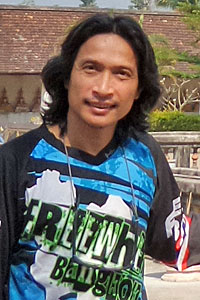I get to know people when I travel for work, but I rarely see them again in person because each time I travel, I go to someplace different. Earlier this year, however, as I was about to leave a tourism fair, I bumped into the owner of a resort on Koh Mak, the island of Trat province famous for its efforts to become a "low-carbon destination".
Then, a couple weeks ago, I met him by chance again on a Bangkok street. This time we arranged to set a date for another meeting after work a week later, so we could have more time to catch up. He wanted to tell me about something going on in his beloved island that is not publicly known, something not so pretty.
Since Koh Mak is a small island and every resort operator knows one another, he asked me not to reveal his identity. So let's call him Somchai.
"When people think of Koh Mak, they picture a pristine island free of environmentally damaging tourism activities and developments," said Somchai during our meet over noodles. "But what people see in the media is not the full picture."
He explained that, unlike what outsiders may think, the five local families that own most land and resorts on Koh Mak are not on good terms with one another. They are divided into two groups, each with a certain amount of political power. "One group takes control of the TAO [tambon municipality organisation] while the other has a member in the kamnan position." A kamnan is the head of a tambon, which is made up of villages. Koh Mak is designated as a tambon.
The divide results in a lack of co-operation between the two sides. "When one side holds a meeting, it's not a surprise that the other will not attend," Somchai said, adding that each group makes sure that projects supported by agencies like the Tourism Authority of Thailand and the Designated Areas for Sustainable Tourism Administration, as well as the publicity that comes with them, benefit their members first.
According to Somchai, there are also changes on Koh Mak that visitors who spend just a few days on the island may not notice.
"The main road has been widened, from 4m to 6m. At the same time, there's no space left for proper sidewalks," he said, adding that new buildings were also constructed too close to the road.
"The wider lanes naturally tempt the drivers to go faster, making the road more dangerous," he said, adding that over the past few years he has seen the number of motorcycles and pickups continually rising.
"Accidents and conflicts are increasing. And when a problem happens, the police dare not do anything. Everybody is connected to one of the political groups," he lamented, adding that drug use is not uncommon.
By the time we finished our noodles, Somchai revealed to me a few other things, which I cannot write about. The most important, however, is that the local people must leave their rivalry behind and genuinely work together to make sure Koh Mak will always maintain its "low-carbon" practice, as well as the rustic, natural charm that makes the island a dream destination for travellers from around the world.
Pongpet Mekloy is travel editor of the Bangkok Post.
